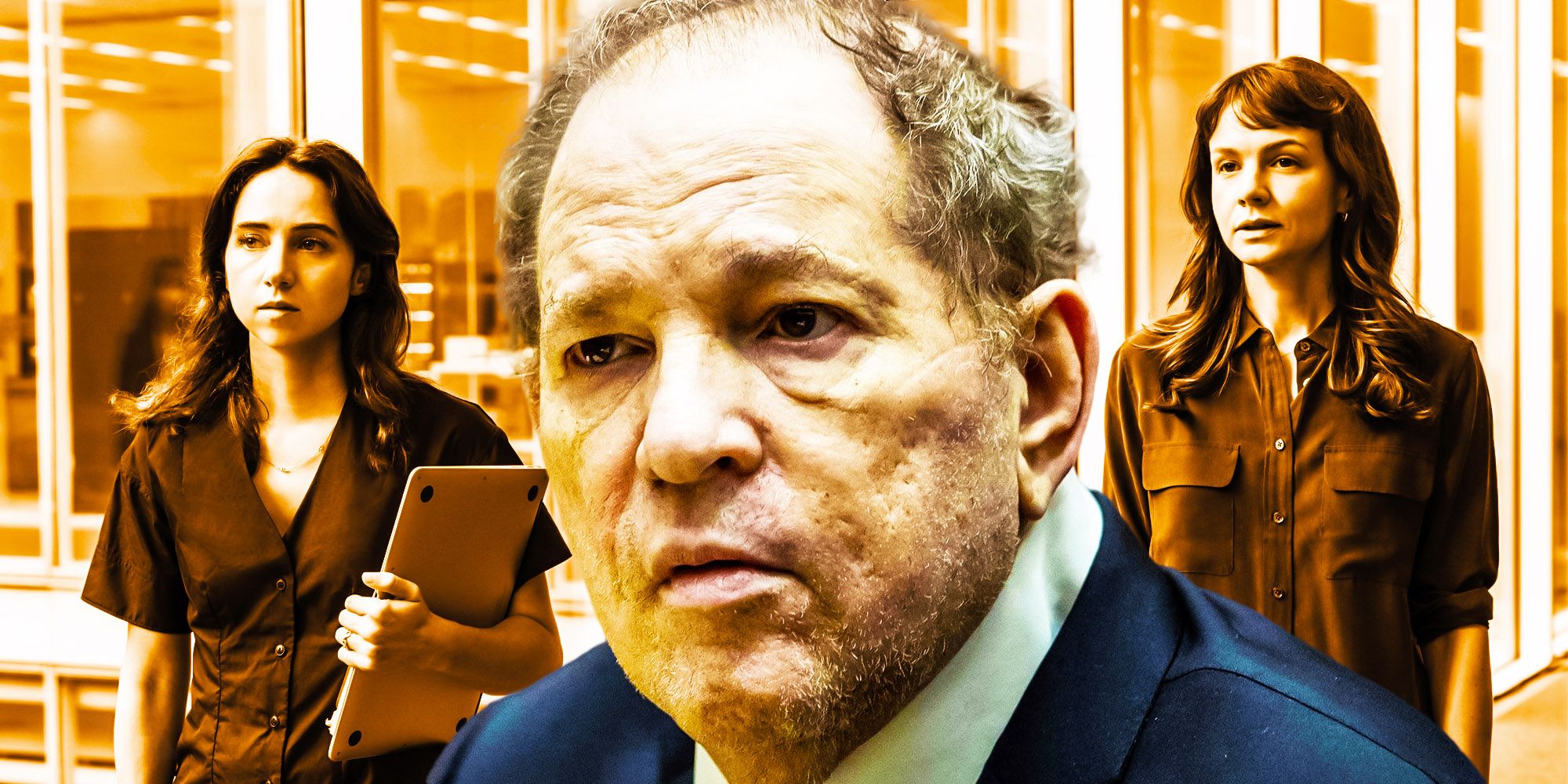The She Said true story and how accurate it is to The New York Times investigation into Harvey Weinstein adds to the compelling nature of the movie. Having been a powerful Hollywood producer for decades, Harvey Weinstein was well-known among the film industry. His two film production companies, Miramax and The Weinstein Company, produced several popular and award-winning movies, including Pulp Fiction, Good Will Hunting, and Inglourious Basterds, among several others. With the movie landing on Peacock Premium, the She Said true story will be of even more interest.
Directed by Maria Schrader from a screenplay by Rebecca Lenkiewicz, She Said stars Carey Mulligan and Zoe Kazan as New York Times journalists Megan Twohey and Jodi Kantor, respectively. The film follows the journalists’ investigation into Harvey Weinstein, and reveals the shocking and disturbing behaviors and allegations that have been secretly discussed and reported within Hollywood’s inner circle over decades, but have only been made public in recent years. How much of She Said is accurate? What have been the ramifications following the article’s publication? The latest biopic gets the full true story breakdown.
Is She Said Based On A True Story?
She Said is based on the true story of how Twohey and Kantor investigated Weinstein and the allegations of sexual misconduct against him, and how often the Hollywood producer paid off women in his employ to keep quiet about what happened. Weinstein appears in She Said but is never fully seen and mostly heard over the phone. The film is less about the published New York Times article itself, and more about the details of the investigation, including the women Twohey and Kantor spoke to for their story, their experiences with Weinstein, and the hurdles they went through in a bid to get it published. Many of the film’s details come from Twohey and Kantor’s 2019 book, She Said: Breaking the Sexual Harassment Story That Helped Ignite a Movement.
How Accurate Is She Said To The Real-Life NYT Investigation
She Said is a journalism movie that stays relatively true to the real-life investigation that Twohey and Kantor initiated. Rather than sensationalizing the events of what happened, She Said focuses on the details of the book and allows the content to speak for itself. Things like Laura Madden’s initial refusal to go on the record before changing her mind, as well as the publication of the article happening around the time of her breast cancer reconstructive surgery are all true. It’s also accurate that Twohey and Kantor retrieved a memo written by Lauren O’Connor, and that they traveled to speak with some of Harvey Weinstein’s victims, many of whom were women employed with his production company at the time of their encounters with him.
Did Megan Twohey & Jodi Kantor Scoop Ronan Farrow?
Throughout She Said, Twohey, Kantor and their New York Times colleagues mention that Ronan Farrow, a fellow journalist, was also investigating sexual misconduct allegations against Harvey Weinstein for The New Yorker — he was. Farrow conducted a ten-month investigation that not only corroborated the claims from Twohey and Kantor’s article, but included new ones, such as an oral sex allegation from Italian actress/director Asia Argento. Many will have likely read Farrow’s story, but Twohey and Kantor actually published their ground-breaking article five days before Farrow’s was published by The New Yorker. The two articles’ proximity created a ripple effect in Hollywood, especially after previously attempted investigations into Weinstein didn’t happen.
How The NYT Story Helped Convict Harvey Weinstein
Following the publication of Twohey and Kantor’s article on October 5, 2017, Harvey Weinstein was fired from his position three days later on October 8. Furthermore, four members of The Weinstein Company’s board resigned from their position following the allegations of sexual misconduct being made public. It’s worth noting The New York Times article claimed Weinstein’s behavior was no secret to the inner circle at both of his production companies prior to the allegations being public knowledge. Shortly after, a criminal investigation was opened into the sexual misconduct claims and Weinstein was arrested several months later, in May 2018.
Two years later, in February 2020, Weinstein was found guilty of felony sex crime and rape and sentenced to 23 years in prison in his New York case followed by an additional 16-year sentence for Los Angeles case. The NYT article, compounded by Ronan Farrow’s additional revelations from his New Yorker investigation, ultimately led to what many called the “Weinstein effect” because it impacted sexual predators and abusers across the film and other industries. It also gave victims the confidence to speak up about their experiences of sexual assault and harassment (by way of social media and through media publications), reigniting the #MeToo movement, which was originally started by Tarana Burke in 2006. The NYT article was crucial for its takedown of one of the most powerful producers in Hollywood.
Is She Said Objective (& Has It Been A True Reckoning For Hollywood)?
She Said is a film about a formerly powerful movie producer, and the investigation that ultimately leads to his downfall. However, the biopic is produced by Brad Pitt — who is known to have worked with Harvey Weinstein on films such as Inglourious Basterds and Killing Them Softly — under his Plan B Entertainment company, despite knowing of at least some of Weinstein’s offenses, including allegedly sexually assaulting Gwyneth Paltrow, who dated Pitt in the 90s, and ex-wife Angelina Jolie’s traumatic run-in with the producer. (Jolie revealed it was hard for her when Pitt worked with Weinstein at the time.) What’s more, Pitt himself has been accused of abuse by Jolie, who alleges Pitt hit her and choked one of their children.
To be sure, She Said is objective in its handling of the investigation, as it’s focused primarily on what went down behind the scenes leading up to the publication of the article. To that end, the biopic is an examination of a subsection of Hollywood and how the media can effect change in an entirely different industry. With Weinstein’s downfall, a reckoning did happen, with his arrest and imprisonment showing there can be consequences to heinous actions. It also served as a warning to others in the industry who sexually assaulted or abused others, with the Weinstein effect leading to the firing of producer Peter Lenkov and the resignation of former CBS CEO Les Moonves, among others.
However, She Said comes at a time when it seems like things in Hollywood (and in other industries) are regressing, with many women who work behind the scenes in film claiming they, or someone they know, have been physically or verbally harassed since Twohey and Kantor’s Weinstein article was published. On a larger scale, Weinstein’s downfall may not have made as big an impact five years later as it should have, but the cultural shift it helped foster is still significant enough to have created even the smallest of changes, even if there is still a long way to go in terms of more substantial change.






